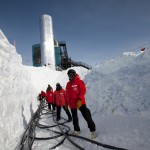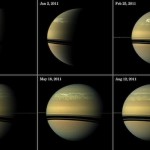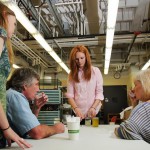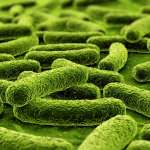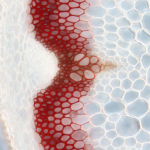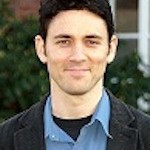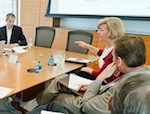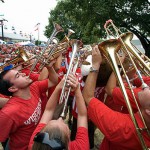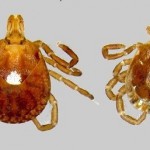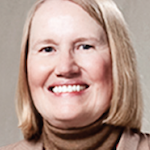Category Science & Technology
Improved computing provides a better look at the cosmos
Building a neutrino telescope - a unique instrument that detects extremely small, high energy particles - out of 5,000 optical sensors embedded in a cubic kilometer of Antarctic ice, a tremendous engineering feat, was just the first challenge.
Massive storm pulls water and ammonia ices from Saturn’s depths
Now, thanks to near-infrared spectral measurements taken by NASA’s Cassini orbiter and analysis of near-infrared color signatures by researchers at UW–Madison, Saturn’s superstorm is helping scientists flesh out a picture of the composition of the planet’s atmosphere at depths typically obscured by a thick high-altitude haze.
Informatics of ‘making’ aims to unite computing, materials and manufacturing advances
Materials science, computing and manufacturing have all evolved into formidable forces on their own in recent years. Support for materials innovation is surging; computing and information are taking on an ever more powerful role in research; and American manufacturing faces a transformation at the hands of the “maker” movement and of major government and industry initiatives.
Microbiome and human health workshop
The opportunity to couple this emerging field and a traditional strength of UW–Madison — large longitudinal studies such as the Wisconsin Longitudinal Study; the Beaver Dam Eye Study; MIDUS, Midlife in the United States; and the Wisconsin Sleep Cohort — will be explored in a small, one-day workshop to be sponsored by the Center for Demography of Health and Aging and the Center for Demography and Ecology.
Tasty Solution: Better beverages for people who have trouble swallowing
After having a stroke in 2008, Jan Blume lost the ability to swallow for two full years. As she slowly regained that vital function, she faced a new challenge: drinking the thickened beverages that are recommended for people with swallowing problems, or dysphagia. She found the drinks almost intolerable.
Geoscience field camp takes the classroom to the mountains
Tina Porter (B.S.’13, Geology and Geophysics) left the flat farmlands of Wisconsin for the rugged terrain of the Utah mountains this summer to put her geology skills to the test.
Tuberculosis genomes portray secrets of pathogen’s success
By any measure, tuberculosis (TB) is a wildly successful pathogen. It infects as many as two billion people in every corner of the world, with a new infection of a human host estimated to occur every second.
Discovery of new enzyme could yield better plants for biofuel
For nearly a decade, scientists have thought that they understood how plants produce lignin - a compound that gives plant tissues their structure and sturdiness, but can limit their use as a source of biofuels.
Swimming through complex bodily fluids gets simpler
It's an uncomfortable truth of life that our bodily fluids are chock full of microscopic swimming organisms - maybe even more uncomfortable to researchers that those little swimmers do laps faster than the theories describing their motion would allow.
First, fishing. Then, volleyball. Serious fun at Trout Lake Station
Angling for perch at sundown is just one of the perks of Wes Matthews’ summer research job at Trout Lake Station in Wisconsin’s north woods. Another is donning scuba gear and diving for lost equipment. The most important task, though, wouldn’t appeal to everyone. “Basically, I study what fish had for lunch,” says Matthews.
Essential mechanism of symbiosis found in Hawaiian squid
Experiments at the University of Wisconsin–Madison with a small squid that glows in the dark have uncovered a complex conversation that allows the newly hatched squid to attract the glowing, symbiotic bacteria that disguises it against predators.
New gene repair technique promises advances in regenerative medicine
Using human pluripotent stem cells and DNA-cutting protein from meningitis bacteria, researchers from the Morgridge Institute for Research and Northwestern University have created an efficient way to target and repair defective genes.
WID researcher locates “virtual eyes” to enhance 3D experience
3D movies are a popular trend this year, with countless films opting to include features that make viewers feel as though they are a part of the action. But what if 3D technologies in movies were not just a feature, but an entire, encapsulating experience?
Recent sightings: Baldwin talks tech
U.S. Sen. Tammy Baldwin meets with UW–Madison researchers and representatives from Isomark, a company commercializing a Wisconsin Alumni Research Foundation-licensed technology to detect patient infections sooner than is currently possible.
Yin awarded inaugural Hartmann Prize in Auditory Neuroscience
Dr. Tom C.T. Yin was awarded the inaugural William and Christine Hartmann prize in Auditory Neuroscience, given by the Acoustical Society of America at its recent meeting in Montreal.
Exotic lone star tick making a home in Wisconsin
It's shaping up as a summer like no other for ticks across Wisconsin - including the strongest contingent yet of a bloodsucker new to the state.
Hormones may usher abused girls into early adulthood
During the sort of tense situation that makes palms sweat and voices quaver, children and young adults are typically awash in cortisol, a stress hormone that sounds an alarm and prepares the body for fight-or-flight responses to danger.

